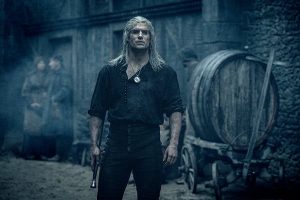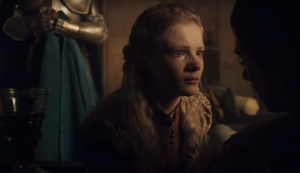In its second season, the family-friendly Netflix sci-fi drama Lost In Space takes our gallant team of heroes on an invigoratingly suspenseful new mission across the galaxy, searching for a planet to call home – preferably a planet that’s not about to be sucked into a black hole, but hey, sometimes you have to work with what you’ve got: and nobody is better at that than the Robinsons, a family of five plucky, over-achieving geniuses each armed with their own specific arsenal of unbelievable skills.

After the Season 1 finale that left the family stranded in an alien region of the universe far from their spaceship, the Resolute, and even farther from their planned destination, the supposedly-peaceful human colony of Alpha Centauri, the Robinsons are forced to take shelter on a tiny beach somewhere on a vast ocean planet. There, they set up a base-camp and settle down – for seven months. And there we find them in the Season 2 pilot, as their collective restlessness is once again spurring them into action, forcing them to move quickly to escape the planet and find their friends onboard the Resolute – if they still can.
In Season 1, the narrative focus was largely on the characters of John (Toby Stephens), Maureen (Molly Parker) and Will Robinson (Maxwell Jenkins), who mostly shared the responsibility of trying to get the family off the aforementioned black-hole planet: all three had big hero moments, leaving little room for their supporting cast to develop into strong, well-rounded characters. The second season does manage to fit in a pretty decent character arc for the eldest daughter, medical student Judy Robinson (Taylor Russell), but its attempts to try and find a narrative purpose for aspiring author Penny Robinson (Mina Sundwall) feel forced and unconvincing – especially since the attempt is half-hearted, and simply fizzles out halfway through this ten-episode series, leaving the younger daughter with no conclusion to her arc (back in Season 1, a lot was made of the fact that Will Robinson didn’t feel special compared to his more naturally talented siblings, and that he was the only one in the family who had actually failed to make the cut to go to Alpha Centauri, before his mother cheated the system to get him through – but can someone explain to me why Will, with his advanced knowledge of mathematics, geometry and geology, feels like the odd one out, when Penny’s entire personality consists of making unnecessary jokes during dramatic moments, and the brief snippets of her writing revealed in this season seem half-baked, to say the least? Though I’m willing to cut her some slack if it’s just a first draft).

The Robinsons’ ally, mechanic Don West (Ignacio Serricchio), has evolved into something of a brusque, headstrong antihero between seasons: some might call him a Han Solo type, but I actually see more similarities to Poe Dameron, a similarly trigger-happy flyboy with a humorous nature, rugged Latino charisma, a shady past, a tendency to disobey superiors, and a strong devotion to a diminutive sidekick (in this case a lucky chicken called Debbie, but the point remains). He doesn’t have a whole lot to do in this season, but I’m hopeful that he’ll have much more time to shine in a third season of the series – which we had better be getting, considering that this season leaves us with a few gut-punch revelations and more than a couple of unanswered questions.
But Season 2’s real star, and the woman who deserves to be the face of this series just as much as The Robot (Brian Steele), is comedian Parker Posey as the Robinsons’ unwilling ally?/friend?/antagonist? Dr. Smith – or Jessica Harris, or June Harris, or whatever name she’s going by at any given moment. Posey’s interpretation of the beloved character is a master manipulator, capable of twisting anyone around her finger with the help of what seems to be a legitimate background in psychology. I don’t think it’s unpopular or controversial to suggest that she’s even a better liar and sneak than, say, Loki in the Marvel Cinematic Universe – and she’s cheated death just as many times. It’s impossible to ever fully trust her or guess at her motives, but the show has a fantastic job of giving the other characters logical reasons to place her faith in her – even if it continuously backfires or places everybody in more danger. Posey was brilliant in Season 1, of course, but here she also has a slightly more zany, vibrant personality: from her slouchy, casual attire to her sudden nautical expertise.

The true emotional core of the show is still Will’s relationship with The Robot, who went missing in the Season 1 finale and to whom Will feels telepathically connected. While their subplot (or, well, I guess it’s technically the main plot) is certainly compelling, it’s also a bit more confusing than the other characters’ relatively simple arcs: there’s a whole bunch of new robots, and new questions about the robots, and about the humans’ connection to the robots, and about the robot culture, and about that weird-looking alien engine that the robots are looking for, and about a million other little things that just show up without any explanation. And while, yes, the story of Will and The Robot has a couple unique complexities, it largely follows the same general structure as any story in which a young child encounters an alien that the powers-that-be would want to hide or abuse, making it the most well-worn of Lost In Space‘s tropes.
Overall, though, the series has largely avoided predictability, and continues to throw curveballs at the Robinsons, masterfully blending wholesome, family-friendly whimsy with darker, more mature themes and genuine thrills, scares and moments of suspense – though, to be perfectly honest, I’m not sure any of the most suspenseful moments in Season 2 quite equal the sensational tension of Season 1, the pilot episode of which opened with Judy trapped under the ice of an alien lake with a mere five hours of oxygen left to breathe, Maureen weaving in and out of consciousness while Penny performed amateur surgery on her wounded leg, Will stuck in a forest fire, about to be killed by The Robot, and John forced to choose which of his children he could save without dooming the others to death. There are a couple moments in this season that come close – but, obviously, they’re sort of spoilers.
So if you’re looking for some wildly exciting science-fiction to dive into, I strongly encourage you to set sail for the stars and get lost in all the emotional drama, CGI spectacle and jaw-dropping action of Lost In Space, Season 2. Unless Netflix doesn’t renew the series for a third season, leaving us with no resolution to this season’s epic finale (unlikely, but you never know), then I can pretty much guarantee that you will not be disappointed.
Series Rating: 8.7/10




